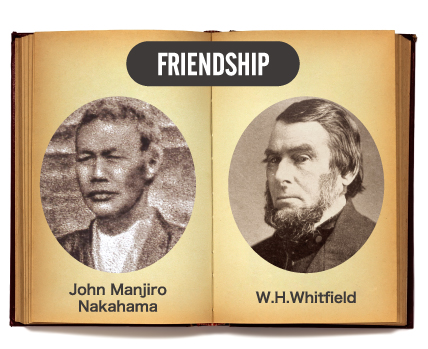About CIE
The first Japan-America grassroots exchange
The friendship between John Manjiro and Captain Whitfield
marked the beginning of Japan- America grassroots exchange.
In 1841 an American whaling boat rescued five shipwrecked Japanese fishermen who were marooned on a remote Pacific island. Among the five was a fourteen year old boy called Manjiro. Manjiro's intelligent good nature soon earned him great respect among the American crew. He was given the name John and taken back to Fairhaven Massachusetts to receive an American education. Under the care of the ship's captain William H. Whitfield, Manjiro studied not only English, science and navigation, but also about American culture and values-about freedom, democracy and hospitality.
At that time, Japan was under the rule of the Tokugawa Shogunate, whose policy of isolationism meant that leaving the country was an offense punishable by death. After 10 years in America, However, Manjiro was determined to return home, to pass on the knowledge and goodwill he had received from Whitfield and the community of Fairhaven. Not long after Manjiro returned to Japan, Commodore Perry arrived calling for an end to isolationism, an event that lead to the birth of modern Japan. John Manjiro played a crucial role in these events, both interpreting and negotiating for the Shogunate, and introducing and explaining American culture and technology to the Japanese.
The friendship between John Manjiro and Captain Whitfield has resulted in more than 170 years of friendship between their descendants. Members of the Whitfield and Nakahama families play a pivotal role in CIE Summits, and serve as a reminder of the enormous potential of grassroots exchange.

The return of John Manjiro to Japan was equivalent to our dispatch of a first U.S. ambassador to that country, because of his successful efforts to assist the Japanese Shogunate in understanding the true nature of our country. This allowed Commodore Perry a more welcome reception upon his arrival than might have been expected otherwise.
Calvin Coolidge, 30th President of the United States (1923-1929)

